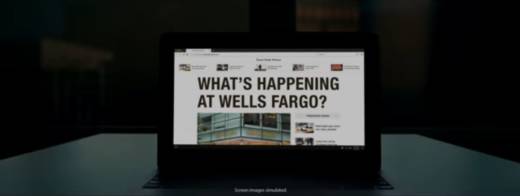People have been increasingly criticizing Facebook ever since the 2016 election, but the criticism peaked over news that data from as many as 87 million user profiles ended up in the hands of an advertising company working for the Trump campaign. The news got so bad that CEO Mark Zuckerberg testified in front of Congress. Even though there has been a bunch of backlash, Facebook hasn’t appeared to take a hit. Its quarterly earnings were well above the projected amount.
As you might expect, each of these apology ads is filled with platitudes and sloganlike rhetoric. They also all follow a similar pattern. First we hear about the company’s successes and accomplishments. Then there is the mistake and mishaps. And finally, promises of redemption.
The Wells Fargo ad trumpets its history, showing us the trusty stagecoach that is the bank’s emblem. The Uber ad talks up how it has helped people get places and has provided opportunities. Facebook filled its ad with lots of cute pictures of babies, friends and birthday parties. It accompanied the feel-good imagery with a narrator who talks about how the service makes us feel just a little bit less alone.
Then comes the moment of the mistake. And the ads all handle this a little bit differently.
Wells Fargo talks about how the company “lost its way,” but it doesn’t bring up the specifics of how it went astray. Uber is even less direct. It doesn’t talk about a past problem, but the new CEO says if “there are times when we fall short, we commit to being open, taking responsibility for the problem, and fixing it.” Facebook has a particularly clever way of bringing up its problems without admitting guilt. And it has to do with how the video is narrated.
The narrator is a Facebook user, not someone from the company or the company itself. This user point of view helps Facebook frame its problems as something that just occurred rather than something caused directly by its policies. This is literally what the narrator says: “Then something happened. We had to deal with spam, clickbait, fake news and data misuse.” There’s no indication of how or why Facebook allowed all of this to occur.
Finally, we get to the promises. Uber says it will usher in new leadership and a new culture. Facebook says it will do more to keep you safe and protect your privacy. Neither offer any concrete examples of how they will do this. Wells Fargo is the most explicit. It says it will end product sales goals for branch bankers. These are the incentives that led to bankers opening up unauthorized accounts for people.
Now, apologizing is nothing new for a big corporation. We’ve seen plenty of mea culpas from companies like BP and Johnson & Johnson. But this is relatively new territory for tech companies. They’ve traditionally been very well liked by their consumers.
But that’s beginning to change, which means we may be seeing a lot more apology ads in the future.
